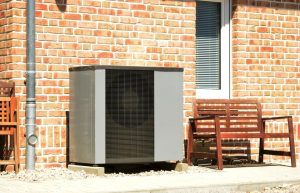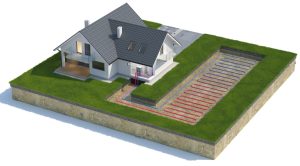Many homeowners are looking at ways they can get heat into their properties more efficiently. One method that has gained traction recently is using a heat pump. Some of you may not know what one of these devices is or what it does. As heating experts, Warm can tell you all that you need to know. So, read on for an answer to what is a heat pump and lots of useful details.
It is the pump’s job to capture heat from the exterior and send it into your house. To do this, it uses electricity. However, the amount of heat delivered far exceeds the level of power you use. Since the system captures the heat that already exists in the environment, it doesn’t use up fuel. As a result, it doesn’t emit any carbon dioxide.
How do these pumps function?
 Everything around us holds heat, also called thermal energy. It flows naturally from warmer areas to colder ones. To supply this energy in a property with colder external temperatures, we must have heat flowing in the other direction. It must go from a colder place to a warmer one. The question though is how does it do it?
Everything around us holds heat, also called thermal energy. It flows naturally from warmer areas to colder ones. To supply this energy in a property with colder external temperatures, we must have heat flowing in the other direction. It must go from a colder place to a warmer one. The question though is how does it do it?
When gas pressure increases, its temperature does also. When the reverse happens, it goes down. The temperature/pressure relationship is the secret to how heat pumps work.
A system makes use of electricity to compress a gas refrigerant. When the pressure increases, so does the temperature. As the heat of the refrigerant is moved to your house via the heat exchanger, it cools down a bit. Next, the refrigerant is permitted to expand, which lets it cool even more. From there, it is cold enough that it can absorb higher levels of heat from the outside and start the process once again.
So, you can use the heat that goes to the exchanger to warm your property. Normally, you would do this with a central heating system. However, it is also possible to use an air to air system.
That should answer what is a heat pump, but you will probably have more questions. You can read on for answers to some of the biggest ones.
Are heat pumps efficient?
 These systems are more efficient if you compare them to other types of heating, including gas and electric boilers. The reason is that the level of heat you create exceeds the amount of electricity they use. The quantity of heat generated for each electricity unit is what we call the Certification of Performance (CoP). Thus, if a heat pump has a CoP of 3.0, it is going to give three units of heat out for each electricity unit.
These systems are more efficient if you compare them to other types of heating, including gas and electric boilers. The reason is that the level of heat you create exceeds the amount of electricity they use. The quantity of heat generated for each electricity unit is what we call the Certification of Performance (CoP). Thus, if a heat pump has a CoP of 3.0, it is going to give three units of heat out for each electricity unit.
Each heat pump comes with a published data sheet that includes what the measured CoP is. You measure the CoP at one point in time, under certain test conditions. In real life though, heat pumps undergo temperature variations across the year. Therefore, the CoP won’t help you with comprehending what the price of running your heat pumps will be all the time.
Instead, we have the Seasonal Coefficient of Performance (SCoP), alternatively known as the Seasonal Performance Factor (SPF). This can reveal the efficiency of your heat pump over the whole year.
Installers of heat pumps have to calculate the SPF based on their system design in your property. The calculation showcases that the pump should work given your location’s average temperatures and other details like radiators. It is preferable for the installer to share the calculation with you prior to starting any work. The SPF shall provide you with a greater indication of what you can expect in relation to efficiency and running costs when you compare to the CoP figure.
Will I save money on my heating bills if I install a heat pump?
While the pumps and compressor need electricity to work, they don’t use as much as the level of heat they move inside from the outside. The level of heat vs the electrical use depends on the output temperature and source temperature. As such, it varies all the time throughout the year, since external temperatures change.
How this is going to influence your energy bill shall depend on a number of elements, like:
- Your central heating system’s design
- The electricity tariff
- Your location and its average ground or air temperature over the year
- What kind of heat pump you install and its efficiency
- The fuel you are replacing and its cost
For property owners using gas boilers, heat pumps will be a tad more costly to run. This is unless you pay particular attention to guaranteeing the maximum efficiency of your pump. You can do this with the best underfloor heating and quality radiators. Yet, since utility prices shift with time, these pumps may become the most cost efficient in the future. They are also the lowest carbon form of heating.
In terms of oil or LPG systems, annual price variations mean that it is hard to provide precise estimates of yearly heating prices. To give an example, heating oil has traditionally been between 40-65p pence per litre throughout the year. However in 2020 the price dropped dramatically before rising to new highs. Overall, heat pumps should be able to save you cash on running prices. This is assuming you install a good quality system.
Contact the Warm team for advice about heat pumps
Should there come a time when you want to invest in heat pumps and need help, you can contact us. We will connect you to a team of experts who know everything about these installations. Plus, we can put you in touch with Gas Safe engineers who can help you with installation work.



